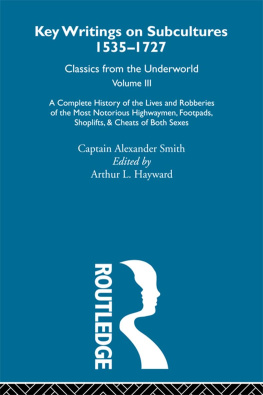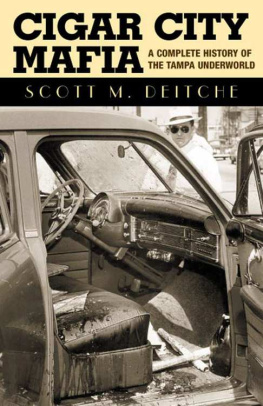KEY WRITINGS ON SUBCULTURES
15351727
Classics from the Underworld
Key Writings on Subcultures 15351727
Classics from the Underworld
Volume I
The Elizabethan Underworld: A Collection of Tudor and Early
Stuart Tracts and Ballads
Edited by A. V. Judges
Volume II
The English Rogue, Described in the Life of Meriton Latroon,
A Witty Extravagant, Being a Complete History of the Most
Eminent Cheats of Both Sexes
By Richard Head and Francis Kirkman
Volume III
A Complete History of the Lives and Robberies of the Most
Notorious Highwaymen, Footpads, Shoplifts & Cheats of
Both Sexes
By Captain Alexander Smith, Edited by Arthur L. Hayward
Volume IV
A General History of the Robberies and Murders of the Most
Notorious Pirates, From their First Rise and Settlement in the
Island of Providence to the Present Year
By Captain Charles Johnson, Edited by Arthur L. Hayward
Volume V
Lives of the Most Remarkable Criminals, who have been
Condemned and Executed for Murder, the Highway,
Housebreaking, Street Robberies, Coining and Other Offences
Edited by Arthur L. Hayward
KEY WRITINGS ON SUBCULTURES
15351727
Classics from the Underworld
Volume III
A Complete History of the Lives and Robberies
of the Most Notorious Highwaymen, Footpads,
Shoplifts, & Cheats of Both Sexes
By Captain Alexander Smith
Edited by Arthur L. Hayward
First published 1926 by Routledge
This edition reprinted 2002
by Routledge
2 Park Square, Milton Park, Abingdon, Oxon, OX14 4RN
Simultaneously published in the USA and Canada
by Routledge
270 Madison Ave, New York NY 10016
Transferred to Digital Printing 2008
Routledge is an imprint of the Taylor & Francis Group
All rights reserved. No part of this book may be reprinted or reproduced or utilised in any form or by any electronic, mechanical, or other means, now known or hereafter invented, including photocopying and recording, or in any information storage or retrieval system, without permission in writing from the publishers.
British Library Cataloguing in Publication Data
A catalogue record for this book is available from the British Library
Library of Congress Cataloging in Publication Data
A catalog record for this book has been requested
ISBN 0415286751 (Set)
ISBN 0415286786 (Volume III)
Publisher's Note
The publisher has gone to great lengths to ensure the quality of these reprints, but wishes to point out that certain characteristics of the original copies will, of necessity, be apparent in reprints thereof.
Although a few years later than the period of this book Hogarth's plate gives an excellent idea of the crowd that flocked to Tyburn Fair. The condemned felon is arriving in the cart, surrounded by the sheriff's officers. His coffin is with him, and he is being ministered to by a devout and compassionate friend, more solicitous than the apathetic ordinary who lolls out of his coach window. The executioner is resting on the gallows, complacently smoking a pipe, and from the spectators gallery a gaol-bred pigeon is being released, to fly back to Newgate to announce that another felon has been turned off.
.
(From Hogarth's Industry and Idleness, Plate XI.)
A COMPLETE
HISTORY
OF THE
LIVES AND ROBBERIES
OF THE MOST NOTORIOUS
HIGHWAYMEN
FOOTPADS, SHOPLIFTS, & CHEATS
OF BOTH SEXES
Wherein their most Secret and Barbarous Murders, Unparalleled
Robberies, Notorious Thefts, and Unheard-of Cheats are
set in a true Light and exposed to Public View,
for the Common Benefit of Mankind
BY
CAPTAIN ALEXANDER SMITH
EDITED BY
ARTHUR L. HAYWARD
LONDON
GEORGE ROUTLEDGE & SONS, LTD.
1926
O F the many rogues whose lives of villainy are recounted in this book by Captain Alexander Smith by far the majority were sent to Newgate and hanged at Tyburn. Both places have vanished; the former is commemorated only in the name of a busy street, and of the thousands who daily pass from Oxford Street into the Edgware Road few know that they are traversing the site of Tyburn Tree.
The path to Newgate and Tyburn was easily to be found in the early years of the eighteenth century. With the exception of petit larceny, which was the theft of an article under the value of twelve pence, all felonies were punishable with death; there was no scientific system for the detection of crime; the evidence of a perjured rogue, the spite of a jilted woman or the impatience of an irascible judge were often enough to ensure a suspected man lodging in the Condemned Hold and a place in the ill-omened cart that dragged its way with such wearisome regularity up the heavy hill of Holborn, to the fatal Triple Tree. True, the very severity of the Law often made juries mercifully bring in a verdict of Not Guilty in the face of damning evidence to the contrary, but the hangman's hands were seldom idle and Newgate was always full.
The old prison of Newgate, standing over and contiguous to the City gate, was a noisome den where men and women, criminals and debtors were herded together like beasts. In a foul, fetid atmosphere, so poisonous that scores were carried off annually by fever ere they could don the hempen collar, every disease of mind as well as of body had full play. Drunkennessnever before nor since has England been so drunken as she was during the first half of the eighteenth centuryharlotry, gambling, every rank weed of degeneration flourished in Newgate as nowhere else, and while the State held the bodies of its wretched victims between stone walls, the devil of vice bound them yet closer in the hideous shackles of corruption.
The rather smug author of A New View of London (1708), observes complacently of Newgate, It is very well governed, the criminals and debtors being kept separate, and are all called to prayers and sermon at least every Lord's Day; and for the better sort, who have the appearance of gentry, there are very good rooms and other accommodation in the Press Yard. How very far he was from the truth will be evident from the words of those who wrote from experience and not from hearsay. The gaol was ill-lighted, the very stones and mortar were encrusted with filth; the water was little, if any, better than sewage, being drawn from a stream which ran under the building and came charged with the overflow of every neighbouring cesspool; and the air was so laden with disease that one Spring, in the adjoining Sessions-House, two judges, the Lord Mayor, and 60 jurymen, witnesses and attendants died of typhus. The destruction of the old gaol in 1780 by the Gordon Rioters was the only happy event in that orgy of stupidity.
Apart from the callousness of the times and the general opinion that nothing was too bad for those who had offended against the Law, the great cause of misery and maladministration in Newgate and every other prison in England was the fact that the keepership was farmed out, and was such a lucrative post that it was eagerly sought after by unscrupulous speculators. In 1696 the office was sold for 3,500over 35,000 in present valueand












